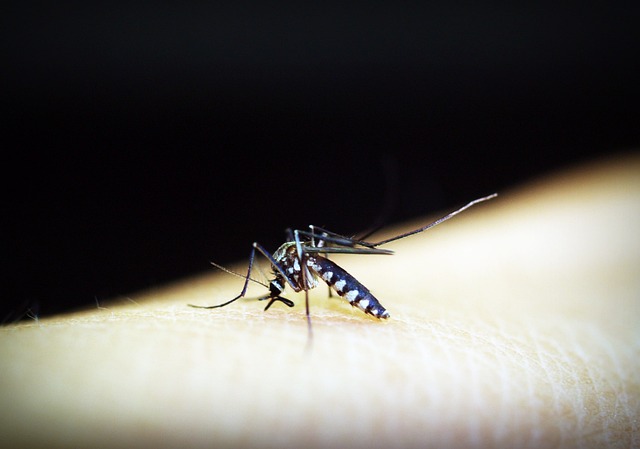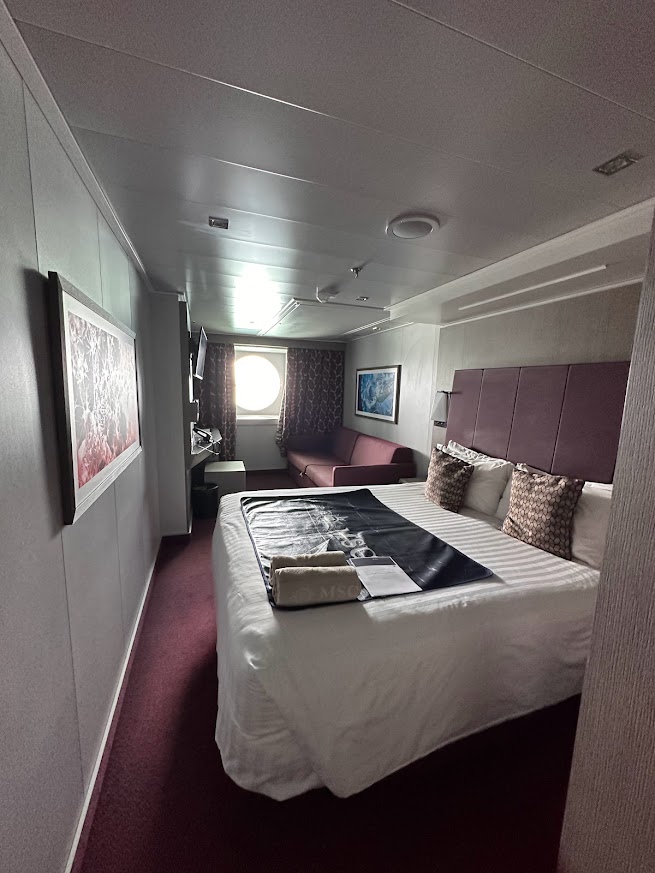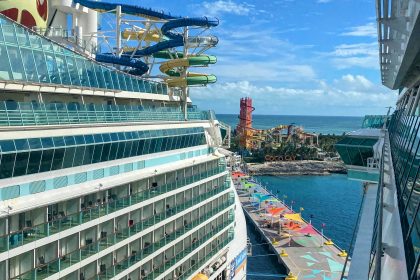Pregnancy is an exciting beginning of your life with your future baby. Over the years, babymoons have become an increasingly popular way for expecting mothers to spend their last bit of “alone time” with their partners. Traveling while pregnant, however, does not come without challenges. Some special accommodations may have to be made to ensure the health and safety of you and your baby. Are you considering traveling while pregnant? Keep reading as I share my valuable pregnancy travel tips for an unforgettable babymoon!
Please note that I am not a doctor. Any medical questions you may have regarding travel and pregnancy should be directed to your medical provider. I have fact-checked my information, but I urge you to confirm everything with your doctor; everyone’s situation is different. I am simply here to provide pregnancy travel tips and tricks based on my personal experience!
This free page might contain affiliate links. I’ll receive a small commission when you purchase from my links, at absolutely no cost to you. I appreciate your continued support!
My Top 15 Pregnancy Travel Tips
Some Destinations are Off-Limits
One of the most important (and potentially life-saving) pregnancy travel tips I can give you is to choose your destination wisely. Unfortunately, not all destinations are safe to visit while pregnant. Areas with transmission of mosquito-borne illnesses, such as Zika virus and malaria, should be avoided. If you must travel to an area where malaria is present, talk to your doctor about taking prophylactic medications. In fact, you should talk to your doctor no matter where you intend to travel; they will be able to advise you best based on your health history and personal risk.
If you have listened to Episode 28 of the Runways and Byways podcast on cruising while pregnant, you may already know that I did travel to a malaria hotspot while on my babymoon. However, I urge you not to do so simply because I did. This was a decision made by both my doctor and me with specific preventative measures set in place.
CDC Malaria Information by Country

Make Sure You Are Fit to Travel Before Booking
While most pregnant women can travel safely, it is not recommended in all cases. Many women with high-risk pregnancies are urged not to travel due to a potential risk of complications. Even if you are not labeled as high-risk, you should receive clearance from your doctor before booking a trip. Nothing is worse than having to cancel your travel plans!
You May Need a Doctor’s Note
Some airlines, cruise lines, and tour companies may require a note from your doctor to ensure you are cleared to travel and/or participate in a particular activity. Prior to booking your trip, make sure you check whether you will need to provide proof of clearance. Even if your airline, cruise line, or tour company does not require a note from a doctor, I suggest you get one just in case; better safe than sorry!
My cruise line required proof that I was both fewer than 24 weeks pregnant and not deemed a high-risk patient. While they wound up not looking at my note, I am still glad I came prepared.
Know Your Airline’s or Cruise Line’s Policies
Expanding on my previous tip, you should be aware of your airline’s or cruise line’s policies on pregnancy before booking your trip. In general, pregnant women are allowed to fly domestically until about 36 weeks gestation. The cutoff for international air travel is typically between 25 and 35 weeks gestation. Cruise lines will usually allow you to board as long as you are fewer than 24 weeks pregnant by the end of the sailing.
Please note that these are the most common cutoffs for pregnant women, but they may vary from one airline/cruise line to another. Make sure to double-check your preferred travel company’s policies before booking. In all cases, as previously mentioned, your doctor should provide you with a note evidencing your due date and clearance to travel.
Travel During Your Second Trimester
Your second trimester (weeks 14-26) is the best time to travel, but why? Well, there are actually a lot of reasons. First off, a lot of the horrible first-trimester symptoms subside at this time; you will likely feel less nauseous and have increased energy, making travel a lot more enjoyable. Secondly, the risk of miscarriage drops substantially in your second trimester. The baby is more well-developed, which provides reassurance to a lot of expectant mothers. Third, the baby bump is usually visible, but not large enough to cause difficulties moving around or sitting for extended periods of time. Who wouldn’t want to take their first baby bump pictures in paradise?
Of course, you need to check with your doctor before assuming travel during the second trimester is right for you. While, statistically, this is the period of time that most doctors will allow travel, every case is different, and only your doctor can tell you whether it is safe.

Travel Insurance is More Important Than Ever
Travel mishaps can and do often happen. Some, unfortunately, can affect your health, which is especially impactful while pregnant. Additionally, pregnancy complications that are unrelated to travel can always arise. Dealing with such issues in a foreign country can be both dangerous and expensive. Luckily, there are travel insurance plans that cover pregnancy-related complications. I always recommend investing in travel insurance, but it is especially important for babymooners.
Pay Attention to Food and Water Safety
In some destinations, even those considered “safe” to visit while pregnant, certain foods and water may be harmful to consume. I traveled to Mexico while pregnant, and, although my OB/GYN approved of it, the water in this country notoriously causes stomach illness. This also includes ice, which is made from the water, and salads, which are washed in the water. Additionally, certain countries may serve raw or undercooked meats in their traditional dishes; while this may not affect the typical traveler, it could be very dangerous for pregnant women. I strongly advise you to do your research before eating or drinking ANYTHING while traveling.
Plan Activities That Won’t Exhaust You
I was full of life during my second trimester. For the most part, I lived as though I were not pregnant. However, when planning my babymoon, I only booked excursions I knew I could handle on my worst days. There were some instances during my babymoon trip during which I needed to take things at a slower pace, and, luckily, the activities I planned allowed for that.
One week after I returned from my babymoon, my energy levels began to decline. It became harder to walk, and I grew more susceptible to heat exhaustion. Imagine if I had traveled one week later and had booked strenuous activities. We would’ve had to cancel the trip! During pregnancy, your body will change fast and in unpredictable ways. Take this into consideration when booking your trip!

Allow for Downtime
With pregnancy comes fatigue, as you may already know. I found that, during my babymoon, napping midway through the day replenished my energy levels and allowed me to make the most of my time. Additionally, the baby needs energy for development; if I used it all up, there wouldn’t have been much left for my baby. Ensure that you plan for downtime when configuring your itinerary.
Ensure You Have Comfortable Accommodation
Now is not the time to take your dream camping trip to the African bush. Pregnancy can be an uncomfortable journey full of aches and pains, so the last thing you’d want after a long day is to come back to a sleeping bag in the dirt. During my babymoon, I was so glad to have booked a luxurious, comfortable cabin on my cruise. My body and baby thanked me for it!

Avoid Overheating
Heat sensitivity is a common symptom of pregnancy, and it can be dangerous. Per the National Partnership for Women and Families, overheating may put you at an increased likelihood of experiencing outcomes such as preterm birth, low birth weight, heart birth defects, and infant mortality.
You do not have to cancel your Bahamian Island vacation, but make sure you take precautions to prevent yourself from experiencing heat exhaustion. On my trip, my neck fan and cooling towel were a godsend. I also made sure to always have a cold bottle of water on hand and stay in the shade as much as possible.
Stay Hydrated
The amniotic fluid your baby is swimming around in is primarily composed of water. My doctor told me that your baby will stop moving even in cases of slight dehydration. In severe cases of dehydration, because the baby does not have fluid to swim around in, you may experience preterm labor. Clearly, staying hydrated has never been so important!
If you are traveling to a tropical destination, you may become dehydrated in the sun without even realizing it. Make sure you have a water bottle on you at all times and drink throughout the day, even when you are not particularly thirsty. We found it helpful for both water storage and hands-free usage to bring a Camelbak. If you are not sure how much water you should be drinking, talk to your doctor. Your baby will thank you!
Avoid Sunburn
Tanning may be a top priority on your vacations, but it shouldn’t be on this one! Sunburn may also cause dehydration and potentially lead to preterm birth. In addition to drinking water, as I mentioned in my last tip, you can also retain water simply by applying sunscreen.
Please note that not all sunscreens are safe for pregnancy. I have linked the sunscreens I used below, but make sure to do your own research and discuss your options with your doctor!
Take Care of Yourself During Transit
Whether you are traveling by air, sea, or land, transit can be rough on the body; this is especially true when you are pregnant. There are extra measures you should take to ensure your safety and comfort depending on your mode of travel, such as wearing compression socks and walking around while on a plane, wearing acupuncture bands and taking pregnancy-safe antinausea medications while on a cruise, and taking regular stops during road trips. While you should do your own research, you should also make note of your personal needs throughout your pregnancy journey and tailor your travel plans to meet them.
Pack Your Prenatal Medical Records and Medications
Even if you are cleared for travel by your doctor, medical emergencies can happen. I recommend bringing your prenatal medical records with you (in your carry-on bag) to ensure you receive the proper care for your particular case. This is not something you want to think about before embarking on your trip, but preparedness is important. Better safe than sorry!
This may be obvious, but you should also pack all of your important pregnancy-related medications, such as your prenatal vitamins, in your carry-on bag. Depending on where you are traveling, you may not be able to just go out and buy them should they be lost or forgotten. I always bring extra and spread them out between pockets in my bag, just in case.
More Pregnancy Travel Tips
Do you want to know more about my experience traveling while pregnant? Check out episode 28 of the Runways and Byways Travel Podcast (Babymoon Cruising: Pros, Cons & Expert Tips) for an in-depth discussion of some of these pregnancy travel tips.
Like this post? Pin it for later!
Do you plan to travel while pregnant? Or, do you have any pregnancy travel tips of your own? Contact me or let me know in the comments below!




